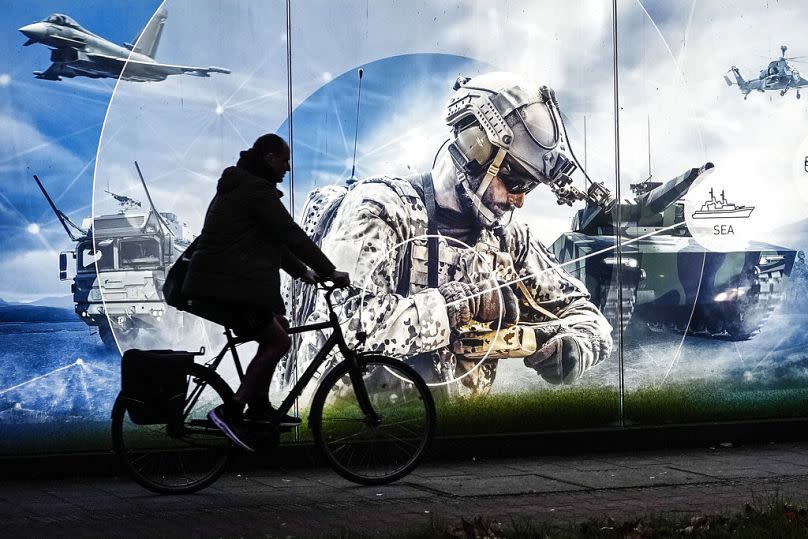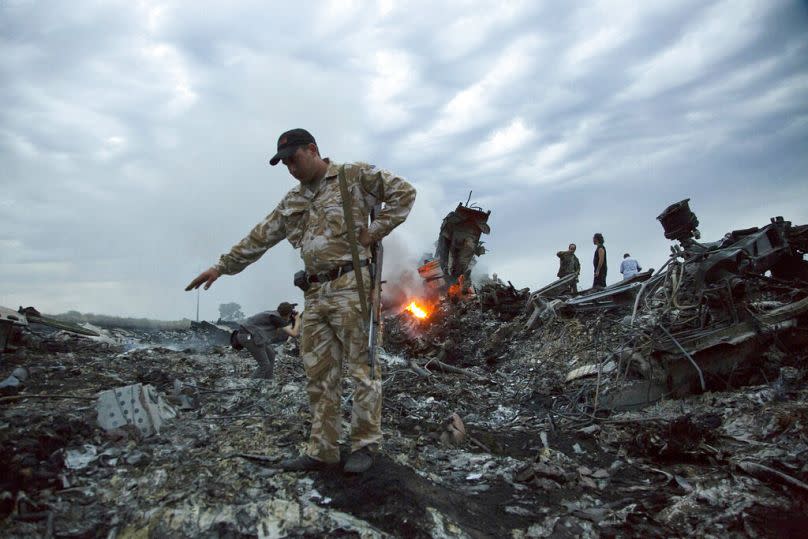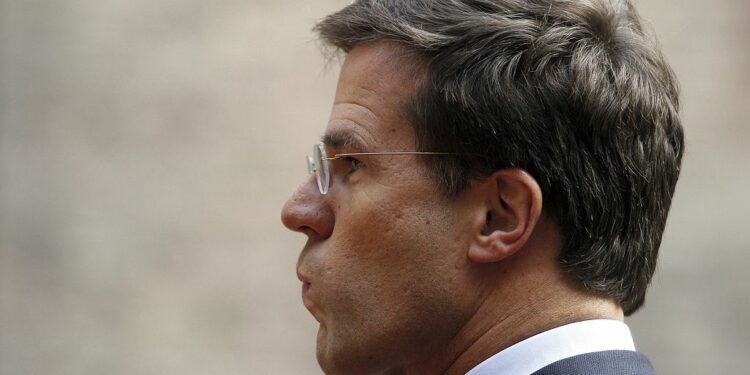President Donald Trump arrives with Dutch Prime Minister Mark Rutte – Carolyn Kaster/Copyright 2019 The AP. All rights reserved
In fact, Rutte shares the same political benchmarks with the rest of the leaders: free-market, global trade, individual freedom and strong transatlantic relations.
Yet, leadership can be fickle and transitory. The people in charge change, the opinion of the electorates is increasingly erratic, and NATO also has member countries that don’t share the same sensitivity for the so-called ”liberal values”.
While Rutte is replacing the current secretary general of NATO, Jens Stoltenberg, a former Norwegian social-liberal PM, which might seem like a minor shift, coming from an EU member state could be the key difference in Rutte’s advantage.
”Mark Rutte and Jens Stoltenberg are both extremely pro-Atlantic,” Federico Santopinto, a senior research fellow at the French Institute for International and Strategic Affairs (IRIS), told Euronews. “The difference between the two politicians is that Rutte comes from an EU country.”
“The Dutch former prime minister could perhaps have the interest to combine better the interests of the European Union with the NATO ones,” he added.
Despite their fiscal strife, Germany, France, Italy, Spain, Belgium, the Netherlands and the UK will have to invest their resources in the defence industry. In the medium term, they might face a dilemma between increasing their public debts or asking their voters to pay more taxes.
Santopinto explained that the risk is that there might not be enough money to finance initiatives under the North Star flag and construct an EU military-industrial complex.
”The EU has been focusing on a defence industrial policy since it has an industrial capacity that NATO by its own nature cannot have, even if it made some attempts in the most recent past,” he said.
“Mark Rutte could finally make clear that NATO has operational dimensions on how to use the troops and to establish the complementarity among the different armies by the standardisation of their equipment,” Santopinto added.
After a history degree at the University of Leyden and before entering politics, Rutte was an HR manager at Unilever for a couple of years. He might use this past professional experience to persuade the member states to make painful financial and political decisions.
The ‘frugal Dutchman’ dilemma
As for NATO spending, the problem of reaching the 2% target is no longer an issue, according to Zandee.
“According to some politicians, especially in Eastern Europe, it is not enough,” he said. “We have to go for 3%, whereas the Poles are already spending above 4% of their GDP. So that will be the issue because to modernise all the armed forces in Europe, not to speak about expanding them, one will need more than 2%.”
”The secretary general does not have his own basket of money where he can get money out of it,” Zandee added. “He can count on his ability to chair the meetings, visit the capitals and put some pressure on the governments.”

A man on a bicycle passes an advertisement at the headquarters of Germany’s biggest arms manufacturer Rheinmetall AG in Duesseldorf, Germany – Martin Meissner/Copyright 2023 The AP. All rights reserved.
As for the war in Ukraine, the biggest challenge for NATO in Europe since the Berlin crisis in 1961, Rutte may have to mediate among the Alliance’s members, who are divided on three big strategic moves toward Russia: containment, rollback, and engagement.
Like the European liberal family, Mark Rutte has proved, as a prime minister, to promote the roll-back that implies the Russian withdrawal from Ukraine to the borders of 2014 (including Crimea and the Donbas) and no political relations with the current Kremlin regime.
”Rutte is a staunch supporter of the transatlantic relations,” Santopinto said. “Like Stoltenberg, he defends the liberal (internationalist) approach to Ukraine. Recently, when he was still prime minister, he was one of the first to propose the F16 to Ukraine.”
MH-17 flight, 10 years later
As a Dutch politician, Rutte tends to be more pragmatic and occasionally opportunistic rather than idealistic.
Nevertheless, in foreign policy and in relations with Russia, his liberal approach began prevailing over business-as-usual practicality on 17 July 2014, when the Malaysia Airlines MH17 flight between Amsterdam and Kuala Lumpur was shot down by a Russian antiaircraft missile while flying over the Donbas.
The battery and the crew were Russian and were operating for the Donbas pro-Moscow separatist militias of the so-called People’s Republic of Donetsk, acting in the conflict in the region under the orders of Igor Girkin, aka “Strelkov”, a former GRU operative who was among the people convicted by a Dutch court for shooting down the airliner.
All the 298 people on board, including passengers and crew members, lost their lives. 193 of those victims were Dutch.
”He did not have this forward-looking attitude toward Russia, despite there were indicators that Putin was modernising his armed forces,” Zandee said. “Rutte’s government continued doing business with Russia like the Germans and the others.”
“But the pictures of the MH17 represented a sort of key turning point because it had a tremendous impact that showed the ugly face of Russia,” he added. ”The MH17 was the turning point followed by other events. It played an important role deep in his soul, in his mind. He’s always mentioning it as an important milestone in changing his attitude (toward Moscow).”

In this July 17, 2014, file photo, people walk amongst the debris at the crash site of MH17 passenger plane near the village of Grabovo, Ukraine, that left 298 people killed. – Dmitry Lovetsky/Copyright 2019 The AP. All rights reserved.
The liberal supporters of the roll-back approach towards Russia in NATO and in the EU are looking with some apprehension at political events in France and in Germany, with a special focus on the US November presidential elections.
They are deeply concerned that reaching a ceasefire and containing Russia along the frozen conflict front line could eventually prevail.
And, in case of relevant political changes, they are afraid that some Western power could even start a renovated policy of engaging Putin’s Russia, or at least some sort of detente.
”Everybody is waiting for the US presidential election because Rutte has much more sympathy for [the Democrats],” Santopinto said. “Meanwhile, relations with Donald Trump could become more complicated.”
As the head of the Dutch government, Rutte met Trump during his administration between 2016 and 2020.
Related
Little lies of an honest broker
Zandee recalled that Rutte has a reputation for being “extremely smart” in negotiations with other leaders.
”Some Dutch diplomats remember that at a NATO summit, Rutte told Trump: ‘Donald, you know, now we, the Europeans, are spending 40 or 45 billion more on defence since you have been at the White House. That is thanks to you’,” he said. “Of course, it was not true.”
“But he gave all the credit to Trump. And then Trump was flattered. Since then, Rutte got a very good entry ticket into the White House under Trump,” Zandeed continued.
The options discussed at the Washington summit give NATO a wide range of potential actions, stretching from the traditional European theatre to the Far East and the China Sea.
The Asia pivot strategy is mostly a US bid, while most EU member states would keep NATO’s main focus on the Eastern European flank, at most, in the southern Mediterranean, the Middle East, and the Sahel.
Extending the scope of the potential military operations of the alliance to the Pacific and the Far East could represent extra costs for both armament and logistics, as well as a dangerous progressive disengagement of the US military forces from Europe.
But could a Dutch secretary general become a broker between the European theatre powers and the let’s-turn-to-Asia advocates?
”China, of course, is a different matter. So there you see that countries like the UK and the Netherlands are following the Americans in terms of showing military presence in the Pacific, and the French are doing it, too,” Zandee said.
“But more continental countries don’t think that it is important,” he added. “So, this is a potential division among European countries and a transatlantic split between Europe and the United States, it’s both an internal European and a transatlantic issue.”
China remains a fundamental trade and business partner and a huge competitor for Germany, France, Italy, Poland, and Hungary. For the EU, Beijing’s disputes are mostly of an economic nature. Very few European policymakers look at China as an existential military threat.
”If you go back to 2021, people were talking about a new NATO strategy to contain China. And then, of course, the invasion in Ukraine came, and the whole issue was dropped,” Zandee said. “Now, we put it at the top of the list, perhaps at the same level as Russia. But what does it mean? It’s a totally different degree of threat.”
Source link : http://www.bing.com/news/apiclick.aspx?ref=FexRss&aid=&tid=66fccf0f7a464c02b10da383d382d504&url=https%3A%2F%2Fnews.yahoo.com%2Fnews%2Fteflon-mark-ruttes-political-survival-123123496.html&c=11638434344593056933&mkt=de-de
Author :
Publish date : 2024-10-01 19:26:00
Copyright for syndicated content belongs to the linked Source.



